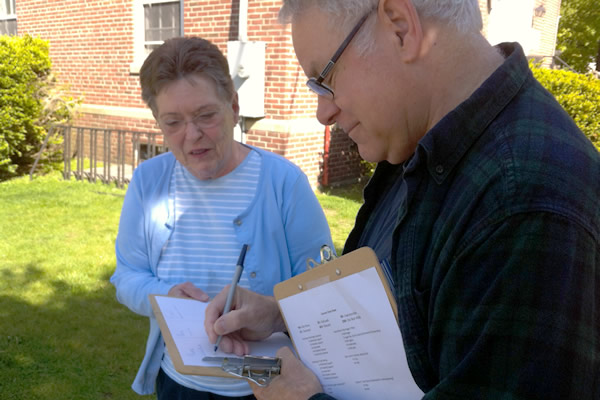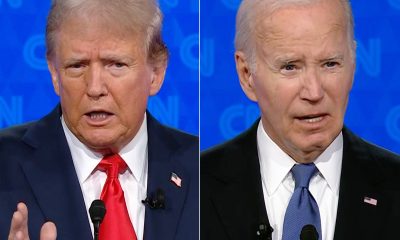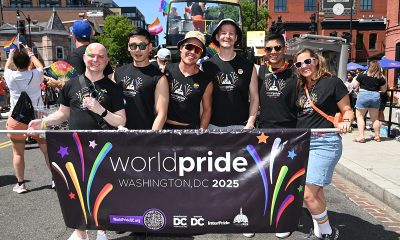National
Maine marriage campaign optimistic going into referendum
Polls indicate majority of voters would support ballot measure to allow same-sex marriage.
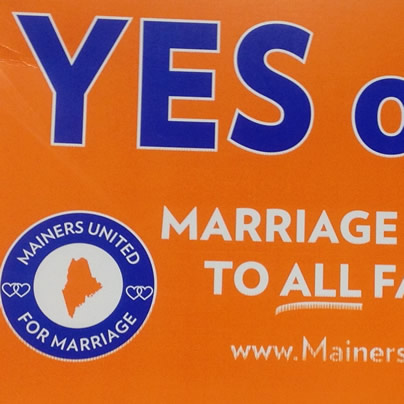
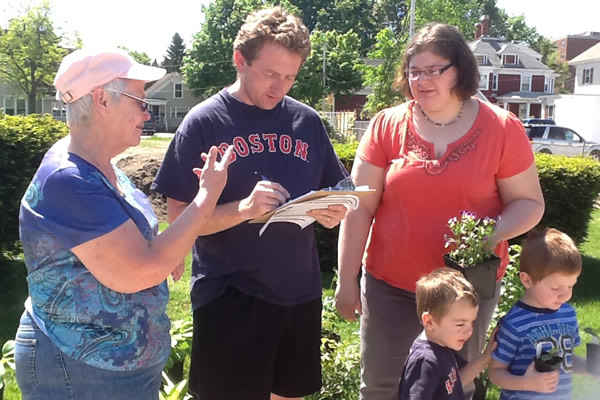
A Mainers United for Marriage volunteer speaks with likely voters in Sanford (Photo courtesy of Mainers United for Marriage)
SCARBOROUGH, Maine – Portland resident Ellen Ward never thought she would find herself speaking with fellow voters in support of marriage rights for same-sex couples.
The self-described introvert changed her mind, however, in 2009 when she listened to gays and lesbians and others testify in support of a same-sex marriage bill during a legislative hearing in Augusta, the state capital.
“They were leading very what most people call normal lives and just wanted to be able to affirm their love and commitment in the same way that other people got too,” Ward told the Washington Blade as she canvassed a suburban Portland neighborhood in the rain on Thursday afternoon. “And I was just really impressed with people standing up and testifying about that and churches testifying about that.”
Nearly three years after Maine voters repealed the state’s same-sex marriage law that then-Gov. John Baldacci signed, supporters of nuptials for gays and lesbians remain confident that a ballot question that would allow them to tie the knot will pass.
“What’s so unique about Maine is because we’re the first state to ever go on the offensive and bring the issue directly to the voters; we’ve been able to dictate our own timeline,” Matt McTighe, campaign manager of Mainers United for Marriage, the group supporting Question 1, told the Blade during an interview at his Portland office on Friday. “There was never a ticking clock. Every time this has come up before when it’s defensive it’s always in the current — something happens, a precipitating action, a court case, a legislative victory whatever. Our opponents then do something to undermine that or write something into the constitution or whatever. And now we’re on their turf. Now we’re playing defense on their side of the field.”
Voters in 2009 repealed the same-sex marriage law by a 53-47 percent margin. McTighe, a former Human Rights Campaign staffer who has worked on marriage efforts in Massachusetts and in other New England states for MassEquality and the Boston-based Gay and Lesbian Advocates and Defenders, described the 2012 campaign in Maine as a “night and day kind of difference” from that run ahead of the 2009 referendum.
“It’s always been designed from the ground up as a campaign for voters,” he said. “We didn’t have to worry about the legislature. We weren’t thinking about a court case or anything like that. Right from the beginning we’ve tried to figure out who are the voters we need to be talking to, let’s employ some of the most sophisticated modeling and tactics that have ever been applied to the marriage movement, let’s bring in the best people, the best consultants, the best field organizers, the best team and put together a plan and a model to figure out who we need to talk to.”
Voter: Same-sex marriage “doesn’t really affect me”
Maine is one of four states with either a same-sex marriage referendum or a constitutional amendment that would define marriage as between a man and a woman on the ballot next month. The Maine Freedom to Marry Coalition in January submitted more than 105,000 signatures to the Secretary of State in order to bring the issue before voters.
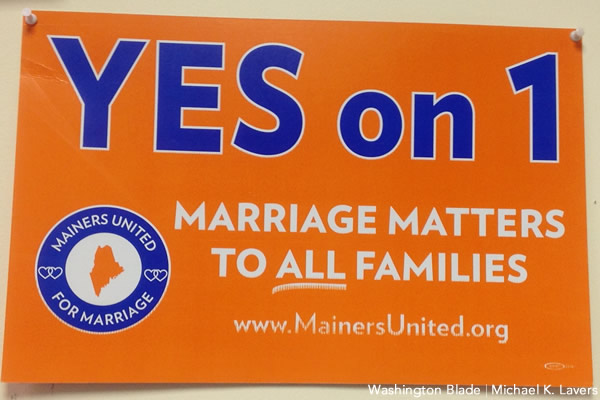
Polls indicate a majority of Maine voters would support a ballot measure to allow same-sex marriage. (Photo by Michael K. Lavers)
A Portland Press Herald poll conducted between Sept. 12-16 shows Question 1 leads by a 57-36 percent margin. A Public Policy Polling survey late last month indicates 52 percent of likely voters support the ballot measure, compared to 44 percent who oppose it and four percent who remain undecided.
Several Scarborough residents with whom Ward spoke said they would support Question 1.
“I’ll probably vote for it,” said one teenager who turns 18 on Nov. 1. He told Ward that he also works with a lesbian. “It doesn’t really affect me. I’m not really 100 percent for it, but I have nothing against it. Not to put it the wrong way but I really don’t care. Do whatever you want. If anything it’ll be better for the economy.”
A woman who lives on a nearby cul-de-sac told Ward that she plans to vote against the ballot question.
“I personally don’t have a problem with you getting together, but I’m not in favor of calling it marriage,” she said. “It’s a sacrament. To redefine marriage, I would vote no.”
Ward conceded the woman’s position against marriage rights for same-sex couples was “discouraging.” She did acknowledge, however, that she feels that her support of basic rights for gays and lesbians was encouraging.
“People have come a long way on that issue, certainly than even 20 years ago,” said Ward, who recalled a telephone conversation she had a couple of months ago with a 90-year-old woman who marched against racial segregation in the 1960s. She initially said she opposed nuptials for gays and lesbians, but Ward said she suddenly changed her mind when she realized the parallels between the civil rights and same-sex marriage movements. “I just feel there are so many people that we talk to these days who are completely supportive.”
Marriage remains “personal” for voters
Six Mainers United for Marriage ads continue to air on local television stations. These include one that features four generations of a family from the Downeast town of Machias and another that spotlights firefighters who support nuptials for gays and lesbians. Protect Marriage Maine, the group opposing Question 1, debuted their first two television ads on Monday.
“You have to make this about the voter themselves. You need to give them a personal reason to connect with the gay people that they know in their lives, to think about this issue in a way that they haven’t thought of before,” said McTighe, who is also a firefighter in the southern coastal Maine town of York. He applauded President Obama for supporting marriage rights for same-sex couples, but stressed the issue remains what he described as a deeply personal one for each potential voter. “You don’t just change your mind because somebody else did. You have to change your mind because somebody made it personal to you. Somebody showed you what is at stake. And also gave you an opportunity to have your questions and concerns addressed. That’s why the grassroots approach has been so unique, to be able to go out and have door-to-door with everyone in our persuadable universe, those people we identified early on.”
Mainers United for Marriage reported to the state Commission on Ethics and Election Practices late on Friday that it has raised slightly more than $3.35 million so far this year, compared with the $429,794.32 that Protect Marriage Maine has pulled in. McTighe told the Blade that he would like to raise another $750,000 to $1 million “to keep pace with” the amount of airtime that the National Organization for Marriage has reserved on the state’s television stations in the weeks leading up to Election Day.
“Now is sort of the crunch time,” he said. “We’ve been prepping for his. We’ve been planning for this so now we feel like we’re prepared for everything. When they come out with one attack, we’ve got plan A. When they come out with a different attack, we’ve got plan B. We can pull it as needed. We can execute as we need to, as long as we have the resources.”
McTighe said another challenge that the campaign faces of potential complacency.
“Because we are doing really well in the polls and because people are seeing all this great stuff and people love our TV ads and all this other stuff and we’re getting all this great earned media, it’s almost too easy for people to say, well they don’t need my help. They don’t me to volunteer. They don’t need me to donate. They don’t need me to write a check. They’ve got 57 percent in the polls. Well I don’t care as much now,” he said. “But the fact is we’ve never won before. Whether that 57 percent is solid or soft or who knows, we’ll see, but we’ve never won. Until we win, we should just assume that our opponents will dump whatever resources they need. We should just assume that they will stop at nothing. And we should assume that no lead is safe until we can actually win and hold one for just once, at least once. Then we can start saying okay well is a point where you’re safe. We’re just not there yet. We’re not there in any of the states.”
In spite of these potential hurdles, McTighe remains optimistic that Mainers United for Marriage will be able to successfully respond to Question 1 opponents’ ads and statements against nuptials for gays and lesbians during the final weeks of the campaign.
“We feel extremely well positioned to deal with anything they throw our way because we’ve had two and a half years to prepare for everything,” he said. “That is what’s so unique about Maine.”
Ward agreed.
“People have had a lot more chance to think about this,” she said, noting the passage of same-sex marriage laws in New York and other states since the 2009 vote. “It’s very much on people’s minds and people are talking about it now. It’s not so unheard of. I think people are just kind of more getting used to the idea and saying, oh, I have people in my family that this [impacts] or I have neighbors and I think they’re very nice people and wow, you know they want to get married. A lot of people had never thought of that before. I think part of it is people are getting used to the idea. And people who are already on board are saying of course, of course this matters. And more and more they want to see this happen. It just seems a no brainer to them.”
National
House Republicans propose steep cuts in federal AIDS budget
Advocacy groups say move would eliminate ‘Ending HIV Epidemic’ initiative
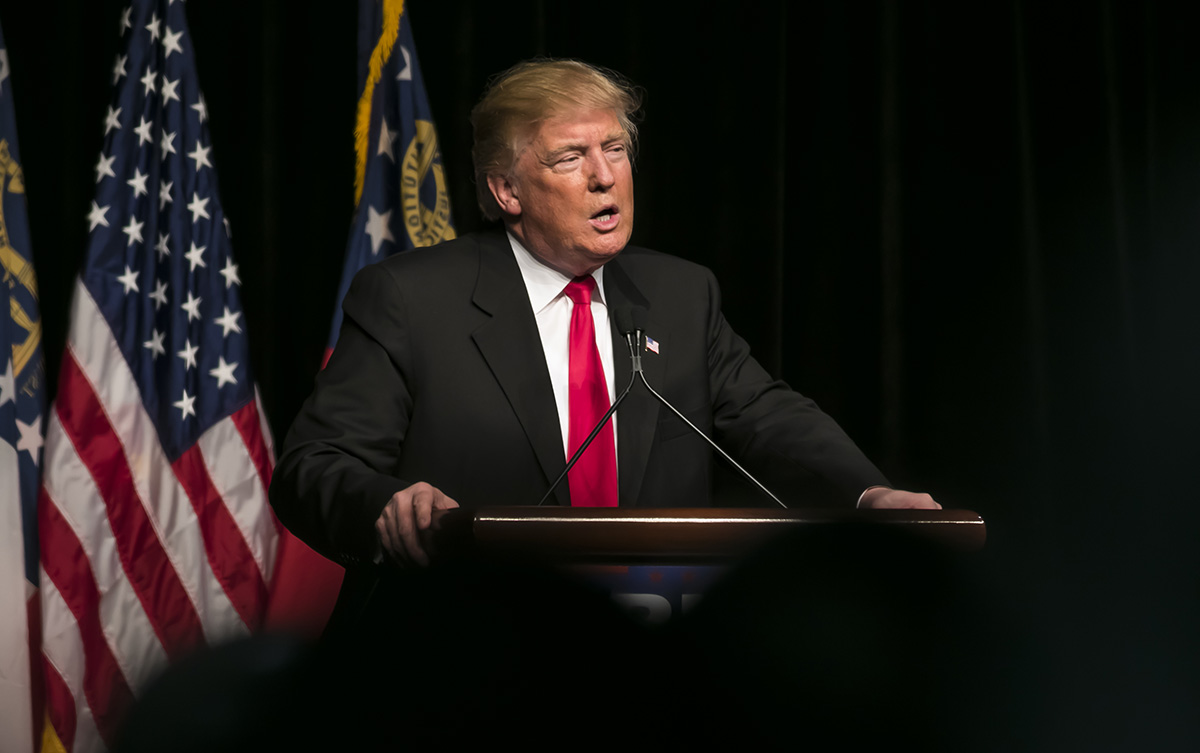
The Republican-controlled U.S. House Subcommittee on Labor, Health, and Human Services, Education, and Related Agencies approved a spending bill on June 26 that calls for cutting at least $419 million from federal AIDS programs that AIDS activists say would have a devastating impact on efforts to greatly reduce the number of new HIV infections by 2030.
The subcommittee’s proposed bill, which includes billions of dollars in cuts in a wide range of other federal health, education, and human services related programs, is scheduled to be considered by the full House Appropriations Committee on July 10. Officials with AIDS advocacy groups say they are hopeful that the full committee, like last year, will refuse to approve the proposed cuts in the AIDS budget.
The proposed GOP cuts would eliminate $214 million from the U.S. Centers for Disease Control and Prevention’s HIV prevention programs, $190 million from the Ryan White HIV/AIDS Program, and $15 million from the Department of Health and Human Services Secretary’s Minority HIV/AIDS Program.
Activists say the impact of those cuts would kill the federal government’s Ending the HIV Epidemic initiative, which among other things, calls for reducing the number of new HIV infections in the U.S. by 75 percent by 2025 and by 90 percent by 2030. The activists point out that ironically the Ending the HIV Epidemic initiative was launched during the administration of President Donald Trump.
“Instead of providing new investments in ending HIV by increasing funding for testing, prevention programs, such as PrEP, and life-saving care and treatment, House Republicans are again choosing to go through a worthless exercise of cutting programs that the American people depend on and will never pass,” said Carl Schmid, executive director of the HIV + Hepatitis Policy Institute.
“While we vigorously fight these cuts, we look forward to working with the entire Congress in a bipartisan fashion on spending bills that can actually become law,” Schmid said in a statement.
Schmid noted that the bill also includes provisions known as “policy riders” that would take away rights and protections from women, such as access to birth control and abortion, and for minorities, including LGBTQ people.
According to a statement released by the office of Rep. Rosa DeLauro (D-Conn.), who is the ranking minority member of the House Appropriations Committee, one of the policy riders would “block the Biden administration’s policies to ensure nondiscrimination on the basis of gender identity and sexual orientation.’ The statement says another policy rider would “prevent policies or programs intended to promote diversity, equality, or inclusion.”
Most political observers believe the Democratic-controlled U.S. Senate would also kill the GOP proposed policy riders and cuts in the AIDS budget if the full Republican-controlled House were to approve the budget bill passed by the appropriations subcommittee.
Rep, Tom Cole (R-Okla.), who serves as chair of the full House Appropriations Committee, released a statement on June 27 defending the subcommittee’s bill and its proposed spending cuts. “The bill provides appropriate and fiscally responsible funding to ensure these departments can continue to perform their core missions while also acknowledging the fiscal realities facing our nation,” he said.
“Importantly, the bill pushes back on the Biden administration’s out-of-touch progressive policy agenda, preventing this White House from finalizing or implementing controversial rules or executive orders,” Cole said in his statement. “It also preserves long standing bipartisan policy provisions protecting the right to life.”
U.S. Supreme Court
Concern over marriage equality in US grows two decades after first Mass. same-sex weddings
Gay and lesbian couples began to marry in Bay State in 2004

Two decades after Massachusetts became the first state to legalize same-sex marriage, a new study reveals both significant progress and ongoing challenges for married LGBTQ couples in the U.S., with a growing sense of insecurity about the future of their rights.
The Williams Institute at UCLA School of Law surveyed 484 married same-sex couples from all 50 states and D.C. The study, released Monday, marks the 20th anniversary of legal same-sex marriage in the U.S.
Researchers found that 93 percent of respondents cited love as a primary reason for marrying, with 75 percent also mentioning legal protections. Over 83 percent reported positive changes in their sense of security, and 74.6 percent noted improved life satisfaction since marrying.
However, the study also highlighted persistent discrimination and growing concerns about the future. About 11 percent of couples who had a wedding reported facing prejudice during the planning process.
Alarmingly, nearly 80 percent of respondents expressed concern about the potential overturning of the 2015 Obergefell v. Hodges decision, which legalized same-sex marriage nationwide. This anxiety has been exacerbated by initiatives like Project 2025, a conservative policy blueprint that some fear could roll back LGBTQ rights if implemented.
The possibility of a former President Donald Trump victory in the upcoming election has further intensified these concerns. Many respondents cited Trump’s previous U.S. Supreme Court appointments and his statements on LGBTQ issues as reasons for their apprehension. One participant stated, “The thought of another Trump presidency keeps me up at night. We’ve come so far, but it feels like our rights could be stripped away at any moment.”
The current political climate has 29 percent of respondents considering moving to another state, with 52.9 percent citing socio-political concerns as a primary reason. This reflects a growing sense of insecurity among LGBTQ couples about their rights and freedoms.
Brad Sears, founding executive director of the Williams Institute, noted, “The data clearly show that marriage equality has had a profound positive impact on same-sex couples and their families. However, it also reveals ongoing challenges and serious concerns about the future of these rights in light of current political trends and the upcoming election.”
Christy Mallory, legal director at the Williams Institute and lead author of the study, added, “This research provides crucial insights into the lived experiences of same-sex couples two decades after marriage equality began in the U.S. The high level of concern about potential loss of rights underscores the continued importance of legal protections and public support for LGBTQ+ equality.”
The study found that 30 percent of surveyed couples have children, with 58.1 percent of those parents reporting that marriage provided more stability for their families. However, many of these families now worry about the security of their legal status in the face of potential policy changes and shifting political landscapes.
As the nation reflects on two decades of marriage equality, the study underscores both the transformative power of legal recognition and the ongoing need for vigilance in protecting LGBTQ+ rights. The findings highlight the complex reality faced by same-sex couples in America today: Celebrating hard-won progress while grappling with uncertainty about the future, particularly in light of upcoming political events and potential shifts in leadership.
State Department
State Department hosts meeting on LGBTQ rights and foreign policy
Event took place before Pride Month reception

Secretary of State Antony Blinken on Thursday hosted a group of LGBTQ activists and politicians from around the world at the State Department.
The event — described as a “Convening on U.S. Foreign Policy: National Security, Inclusive Development, and the Human Rights of LGBTQI+ Persons” — took place before the State Department’s annual Pride Month reception. Participants included:
• Jessica Stern, the special U.S. envoy for the promotion of LGBTQ and intersex rights
• U.S. Ambassador to the U.N. Linda Thomas-Greenfield
• U.S. Trade Representative Katherine Tai
• U.S. Ambassador to India Eric Garcetti
• Suzanne Goldberg, senior advisor to the Under Secretary of State for Civil Security, Democracy, and Human Rights
• Under Secretary of State for Civilian Security, Democracy, and Human Rights Uzra Zeya
• U.S. Agency for International Development Senior LGBTQI+ Coordinator Jay Gilliam
• USAID Counselor Clinton D. White
• National Security Council Senior Director for Democracy and Human Rights Kelly Razzouk
• Assistant U.S. Secretary of Health Adm. Rachel Levine
• National Security Council Human Rights Director Jess Huber
• U.N. Assistant Secretary General for Human Rights Ilze Brandt Kehris
• Icelandic Ambassador to the U.S. Bergdís Ellertsdóttir
• Council for Global Equality Co-Executive Director Mark Bromley
• Outright International Senior Advisor for Global Intersex Rights Kimberly Zieselman
• Essy Adhiambo, executive director of the Institute for Equality and Non Discrimination in Kenya
• Pau González, co-chair of Hombres Trans Panamá and PFLAG-Panamá
“Forty-five years ago, thousands gathered in D.C. in what became the first national march for LGBTQI+, demanding their voices be heard,” said Thomas-Greenfield in a post to her X account that showed her speaking at the event. “We must continue to carry forward the spirit of these pioneers and fight for equal rights and dignity for all.”
Forty-five years ago, thousands gathered in DC in what became the first national march for LGBTQI+, demanding their voices be heard.
We must continue to carry forward the spirit of these pioneers and fight for equal rights and dignity for all. 🏳️🌈🏳️⚧️ pic.twitter.com/oph2Ahmfhq
— Ambassador Linda Thomas-Greenfield (@USAmbUN) June 28, 2024
President Joe Biden in 2021 signed a memo that committed the U.S. to promoting LGBTQ and intersex rights abroad as part of his administration’s overall foreign policy.
“LGBTQI+ rights are human rights,” said Blinken. “Our government has a responsibility to defend them, to promote them — here and everywhere.”
Blinken noted consensual same-sex sexual relations remain criminalized in 64 countries, with the death penalty in 11 of them.
He specifically highlighted Uganda’s Anti-Homosexuality Act and Hungarian Prime Minister Viktor Orbán’s government’s “smearing scapegoating, stigmatizing LGBTQI+ persons — vilifying them with degrading labels, denying them equal rights, normalizing violence against them.” (Gay U.S. Ambassador to Hungary David Pressman this month marched in the annual Budapest Pride parade.)
Blinken noted Iraqi MPs earlier this year “passed legislation that punishes same-sex relations with up to 15 years in prison.” He also pointed out that Indonesian lawmakers approved a new criminal code banning extramarital sex.
“In a nation where same-sex couples cannot marry, these laws effectively make all same-sex conduct illegal and they undermine privacy for all Indonesians,” said Blinken.
“We’re defending and promoting LGBTQI+ rights around the world,” he said.
Blinken noted seven countries — Barbados, St. Kitts and Nevis, Antigua and Barbuda, Dominica, Namibia, Singapore, the Cook Islands — have decriminalized consensual same-sex sexual relations over the last two years. He also highlighted Greece, Liechtenstein, and Thailand this year extended marriage rights to same-sex couples, and other countries are banning so-called “conversion therapy.”
“These achievements are possible because of incredibly courageous human rights defenders and government partners on the ground, but I believe America’s support is indispensable,” said Blinken. “When we engage — sometimes publicly, sometimes privately, sometimes both — when we share our own knowledge and experience, we can and we do achieve change.”
Blinken also announced the U.S. now considers sexual orientation and gender identity are part of the International Covenant on Civil and Political Rights that took effect in 1976.
“This is one of the key treaties committing nations to upholding universal rights,” he said.
“In our regular reporting to the council on human rights, we will continue to include incidents of discrimination or abuse committed against LGBTQI+ persons, now with the clear framework of this well-supported interpretation,” added Blinken. “That will further empower our efforts.”
Blinken reiterated this point and the Biden-Harris administration’s commitment to the promotion of LGBTQ and intersex rights abroad when he spoke at the State Department’s Pride Month event.
“Defending, promoting LGBTQI+ rights globally is the right thing to do, but beyond that, it’s the smart and necessary thing to do for our country, for our national security, for our well-being,” he said.
-

 Canada2 days ago
Canada2 days agoToronto Pride parade cancelled after pro-Palestinian protesters disrupt it
-

 Theater5 days ago
Theater5 days agoStephen Mark Lukas makes sublime turn in ‘Funny Girl’
-

 Baltimore4 days ago
Baltimore4 days agoDespite record crowds, Baltimore Pride’s LGBTQ critics say organizers dropped the ball
-

 Sports4 days ago
Sports4 days agoHaters troll official Olympics Instagram for celebrating gay athlete and boyfriend

